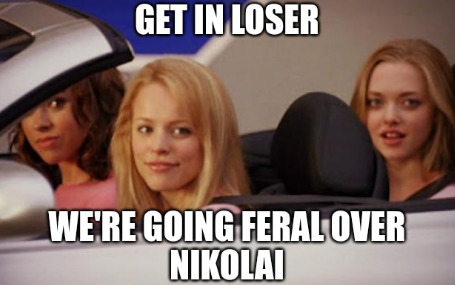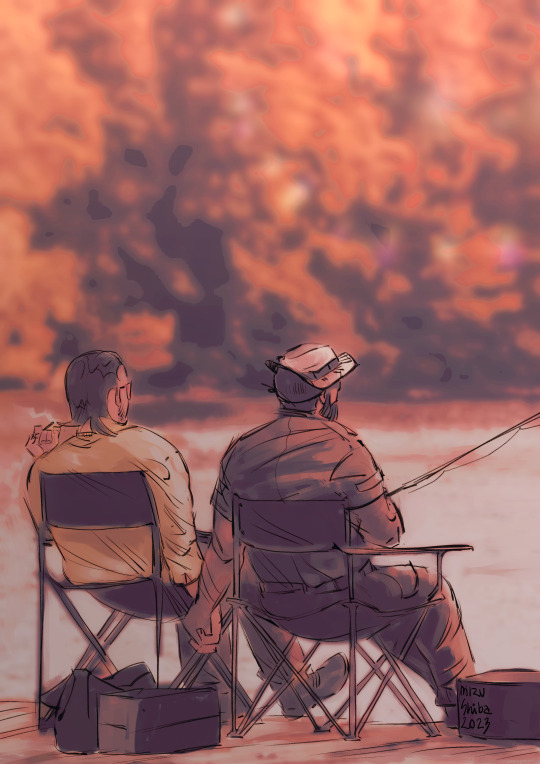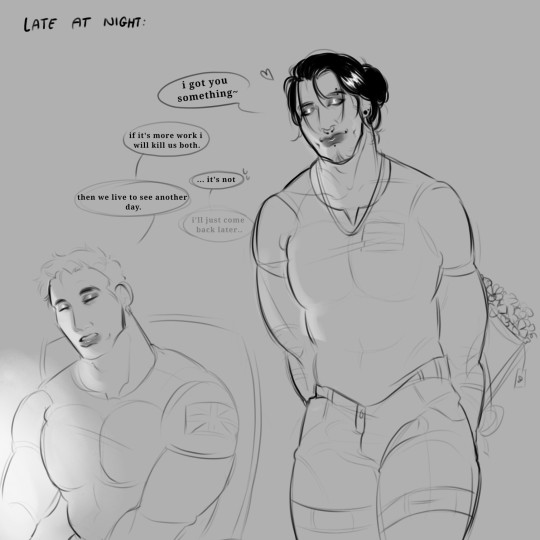#Nik CoD
Text
Soap: On leap day we should remember nature’s most talented leapers.
Soap: Like lizards.
Ghost: Spiders.
Gaz: Deers.
Price: Your ability to jump to conclusions about my personal life.
Soap: We saw you staring at Nik’s arse.
Ghost: Kangaroos.
#cod mw2#cod mwii#call of duty#soap mactavish#ghost riley#ghostsoap#soapghost#johnny mactavish#john soap mactavish#johnny soap mactavish#simon ghost riley#simon riley#kyle garrick#gaz garrick#kyle gaz garrick#john price#captain price#cod nikolai#cod mwiii#cod mw3#cod modern warfare#nik/price#Nik CoD#incorrect cod quotes#incorrect call of duty quotes
808 notes
·
View notes
Text
What is a Russian Character and How to write them
As @sarapaprikas-blog and I were working on this post, we noticed a gap of knowledge and public perception that we want to address. Plenty of characters get labelled as Russian in media without necessarily being Russian. On the other hand the Archetypal ”Russian” character often does not mirror the realities of being Russian. We are to talk about that.
What is Russia?
Russia is a country. It is the largest country in the world with over 140 million inhabitants, stretching over 11 time zones. It is often seen as the successor state to the Soviet Union, which in itself was the successor state of the Russian Empire. The Soviet Union and Russia do not have the same borders or government. However, modern Russia draws a lot from its history as the largest and dominant part of the Soviet Union. Before the Soviet Union, the area was governed by the Russian Empire. The Russian Empire, as the name already indicates, was imperialist. The history as an Empire with massive expansion, colonies and conquering different people, is arguably the biggest reason why modern Russia is as big as it is today.
What is Russian?
There is a difference between the language Russian, the ethnicity Russian, and the nationality Russian. In English the difference can be made out only by context.
Who is Russian?
As aforementioned, there is a difference between Russian (Россиянин) meaning citizen of Russia, and ethnically Russian (Русские). The term Russian (Русские) usually refers to ethnicity, indicating a person who has Russian roots. Russian (Россиянин) implies Russian citizenship, regardless of ethnicity. Thus, a Russian can be someone with Russian citizenship, but not all Russian citizens are Russians in the ethnic sense. Also, not all ethnic Russians have Russian citizenship or live within Russia.
Ethnic-Russians are an East Slavic people. Obviously, they mainly live in Russia. But there are also large communities in Ukraine, Kazakhstan, Belarus, Latvia, Lithuania, and other countries. The traditional religion among Russians is Orthodox Christianity. The main language is Russian.
The country Russia is home to more than 190 ethnicities, including indigenous and autochthonous people, leading to a variety of languages, religions and practiced cultures. So, someone who holds a Russian citizenship, has ethnic Russian heritage and / or speaks Russian, can look very different than the cliche Russian bond girl or evil-doer indicates. That also means that those who get labelled Russian can live very different lives. Writing a Russian character gives you a lot of room outside of the prevalent stereotyped depictions.
Who is not Russian?
Simple - those who say they are not Russian, are not Russian.
Who are Slavs? What is Slavic?
The slavic people are a variety of people, ethnically Russian people are part of that group. However, there are a lot of other ethnic groups that are Slavs without being Russian e.g. Poles, Sorbs, Czech, Ukrainians, and many more. Slavic is the corresponding adjective to Slavs. It is often used to describe the indo-Slavic language group. Slavic is also often used to describe the collectively perceived similarities of Slavic peoples' culture. However, that can be misleading and get’s often orientalised as not everything from Eastern-Europe or Russia is slavic.
Russian vocabulary
Да - Yes
Нет - No
Привет - Hi
Здравствуйте - Hello
Как дела ? - How are you?
Хорошо - Good
Пожалуйста - Please
Не за что - my pleasure
До свидания - Goodbye
Пока - bye
Увидимся - See you later
Хорошего дня - Have a nice day
Простите - I'm sorry. (Plural or honoured addressee)
Помогите, пожалуйста. - Help me please. (Plural or honoured addressee)
Доброе утро - Good morning
Доброй ночи - Good night.
Добрый день - Good day / afternoon.
Pet names in Russian
About pet names. They are either masculine of feminine . Please don't use words like darling, kitten, baby, pretty, sweetie, little one, little fox, etc. as they sound really strange in translation to native speakers.
Pet names are common for close ones (family, close friends, spouses). Sometimes primary school teachers call students by affectionate names. Also sweet old lady may call you ( Дорогой/ Дорогая). But outside of that nobody calls each other by pet names, only using names because Russians are very reserved and private people in general.
Gender neutral pet names:
жизнь моя - my life
солнце мое - my sun or my sunshine
ты мое все - you my everything.
лучик - sunray.
мое сокровище - my treasure.
мое золотце - my gold or sweetheart.
моя любовь - my love.
ты моя радость - you are my joy.
ангелочек - Angel.
прелесть моя - my precious.
Queerness and gender-neutral speech in Russian
Being queer in Russia is hard as queers face oppression. Because of that, there is limited to no public discourse on how to adapt and diversify the language to include queer and especially non-binary identities. This is a problem as the Russian language is extremely gendered and expresses a gender binary in near default. While gender neutral pronouns in Russian exist, it's harder to use them in real life as the neutral pronoun “оно” is mostly associated with things or animals and not living humans, similar to the English “it”.
Often words generally do not have gender neutral alternatives. However, one way we suggest for a more gender neutral speech is to avoid most explicit gendering as the flexible syntax in combination with using plural pronouns in Russian allow for more gender neutral speech.
For Example:
Я люблю их всем моих сердцем - I love them with all my heart.
Расскажи мне о них! - Tell me about them.
Дай им время- give them time.
Я горжусь ими - I'm proud of them.
Они сделает это сами - they do it themselves.
Read more about queerness in Russia here: one two three four
Russian swearing
In Russia, swearing is considered a sign of rudeness and poor manners. Use accordingly.
Also, as mentioned here, Russian syntax and inflection are different from English. Meaning one word can be a whole sentence. We punctuated every swearing that is technically a whole sentence and therefore can stand on its own grammatically.
Блять - fuck
Пошел нахуй. - fuck you
Хуй - dick
Пизда - cunt
Мы в пизде. - we are fucked / “We are stuck in the cunt.”
Ебать - fuck
Ахуел. - are you/they crazy?!
Это пиздец. - this fucked up
Мудак - asshole
Завали ебало. - shut the fuck up
Сука - bitch
Черт - damn
Непизди. - stop fucking lying. / Cut your bullshit.
Пиздобол - Person who lies a lot/ Don't lie
Мамку твою ебал. - i fucked your mom (mostly used by middle schoolers, here in grammatically masculine gender.)
Заебись. - holy shit (could be bad or good depend on situation)
Похуй! - I don't fucking care.
Навешать пиздюлей - to beat up someone.
Срать тебе в рот - To crap in your mouth.
Ты ебанулся. - Are you batshit crazy.
Заебал. - I'm sick of you.
Жопа - ass.
Иди в баню. - soft version of Иди нахуй.
Explanation of the Russian Naming System & Patronyms
The Russian naming system consists of three main elements: first name, patronymic and last name.
Name: This is the first name given to a child at birth. In Russia, the names are chosen by the parents or relatives of the child. Names can be both traditional (Alexander, Anna, Ekaterina) and modern (Sofia, Victoria, Yaroslav).
Patronymic: this is the second name, which reflects the child's origin from his father. Some cultures in Russia also use the mothers name. The patronymic name among Russian people arose in the 10th - 11th centuries and was used infrequently at first, but became widespread around the 16th century. It is formed by adding the suffix "-ovich" or "-aries" to the father's name. For example, if the father's name is Ivan, then his child Ivan or Ivanna will be called Ivan Ivanovich or Ivanna Ivanovna.
Last name: This is a family surname that is passed down from generation to generation. It is usually assigned at birth and does not change without special circumstances. Surnames can come from various sources, such as profession, place of residence, origin, or personal characteristics.
As a result, a person's full name consists of a first name, a patronymic (if applicable) and a last name, for example: Ivan Ivanovich Petrov.
How to respectfully address a person in Russian.
In Russian there are two ways to address someone. Using the polite you (Вы) amd using the formal you (Ты). The choice of mode depends on how well you know the other person and whether you are superior or inferior in terms of age and social position. If you know the person's first name you refer to them by first name and patronymic. For examples:
Борис Юрьевич, Ваши рабочие отлично справились с ремонтом- Boris Yurievich, your workers did a great job with repairs.
Adults never address a person by name, only by surname or patronymic unless the addressee gives permission to address them in an informal manner.
Regulations of most military require their members address each other in formal you( Вы ); subordinates address commanders as товарищ (comrade) + rank , while higher ups address subordinates by military rank and surname. Example:
[Colonel to Sgt. Sidorov] Сержант Сидоров, ко мне!
Sergeant Sidorov, front and center!
[sgt. Sidorov to colonel] По вашему приказанию прибыл, товарищ полковник!
Reporting for duty [lit. arrived at your (pl.) request], comrade colonel!
Military men sometimes use same forms of address, albeit in singular, in friendly conversation. Example:
Сержант, дай сигарету. - Give (sing.) me a cigarette, Sarge.
Military hierarchy in Russia
You can find useful links here. One Two
#könig#sarapaprikasblog#nikto#call of duty 3#call of duty modern warfare 3#creative writing#nik cod#nikolai belinski#cod#cod modern warfare#gromsko#call of duty#gromsko cod#sobiesław kościuszko#grimmwriting#sebastian krueger
258 notes
·
View notes
Text
nik, texting price: answer your phone john
price, texting back: wait a second i can't find my phone
nik: don't worry call me back when you find it!!
nik, 5 minutes later: you're a terrible person. you're killing me. you're killing your favorite husband john.
29 notes
·
View notes
Text

He's so TF2 coded (op try not to express fatherly affection towards an older male without being extremely vague challenge [IMPOSSIBLE!])
#cod modern warfare#cod#call of duty#save me big mild-mannered man ... save me ....#mw2#nik cod#i want a ride in his heli :D#one hug nik please#mud's musings
18 notes
·
View notes
Text
Teen!Ghost: *wandering around the edge of a construction site that Nik and his team are working at*
Worker, spotting him: Hey, kid! You can’t be here
Worker 2, smacking his arm: Watch it! That’s the boss’ kid!
Worker: Oh sh- Sorry, didn’t know you were Nik’s boy
Teen!Ghost: … what
(Later at home)
Teen!Ghost: NIK
Nik, immediately standing: What?! Is something wrong??
Teen!Ghost: AM I YOUR KID??
Nik: Uh- Yes?
Teen!Ghost, clearly trying not to cry: UNDERSTANDABLE HAVE A GOOD DAY *quickly leaves the room*
Nik: Uh-
Price, who was sitting next to him: Think he’s finally coming to terms that he has two dads
Nik:
Price: … are you crying??
Nik, crying: NO
#call of duty#modern warfare#teen!ghost au#simon ghost riley#john price#cod nikolai#incorrect quotes#dad nik#dad nikolai#dad price#dad john price#pricenik
1K notes
·
View notes
Text

@jgvfhl
#he's just so AHHHHH#ya know?#nikolai cod#cod nikolai#nikolai call of duty#pricenik#nik/price#nikpricegraves#nikprice#cod mwii#cod modern warfare#call of duty modern warfare
505 notes
·
View notes
Text

-why did you come if you don't enjoy fishing?
-but i enjoy spending time with you. i will take any chance i can get.
#cod#captain john price#nikolai call of duty#nikprice#call of duty#cod nikolai#nik/price#pricenik#price/nik
1K notes
·
View notes
Text


some messy young nikprice sketches
#i think back in the day price was super strict and brooding#cared a lot about his work and hated anything remotely silly#but over the years he began to realize that he'd be dead before he ever laughed if he didnt loosen up a bit#nik helped him a lot with that#and in turn price taught nik to be harderworking and more skilled#nikprice#nikolai cod#cod nikolai#call of duty#cod#cod fanart#art#captain john price
203 notes
·
View notes
Text

pulled up beautiful baddie @shyravenns in a secret santa!! and i had the honor to draw papa nik with his soft cub just for her!! mwah mwah, much love shy!!
#im so obsessed with dad!nik recently because of her like hHHHH#you guys should check shy's nik art becaUSE HOOO BOIIII HE'S A HOTTIE#shyravenns#my art#2024#call of duty#call of duty: modern warfare#call of duty: modern warfare ii#call of duty: modern warfare iii#cod#codmw#codmwii#codmwiii#modern warfare#mw#mw2#mw3#nikolai#nikolai cod#art#fanart#digital art#digital drawing#digital painting#sketch#doodle#video games#activision
278 notes
·
View notes
Text
Nik: If you chug a bottle of vodka on December 31st at 11:57:32, you’ll probably be vomiting horrendously when the clock strikes midnight.
Nik: Start your new year at rock bottom so you can only go up.
Rookies: Excuse me, where is Captain Price?
Nik: Resting. Now, pay attention.
#cod mw2#cod mwii#call of duty#nik/price#cod nikolai#cod mwiii#cod mw3#cod modern warfare#incorrect cod quotes#incorrect call of duty quotes#Rookies
520 notes
·
View notes
Text
How to write a bilingual character
Plenty of characters across fandoms are multilingual. This is for those writers who feel like writing König, Nikto and whoever else. As polyglots ourselves, @sarapaprikas-blog and I figured this could be helpful for writing English-German or English-Russian bilinguals.
At the beginning we need to point out that writing bilinguals is not just a question of adding a few words from different languages but about a deeper understandings of language. So be warned, a lot is about grammar. fun grammar. frammar!
English-German Bilingual
Continental German speakers tend to be taught British English in school meaning often this is the basis of English knowledge and pronunciation. However, a lot of Internet slang with American English and AAVE mixes in, with most speakers not being aware of it. So mixing that up in your writing is one way to show the contemporary English-German bilingual (who possibly hangs out online too much).
Further, English and German share a lot of structural similarities as both are part of the Germanic language group. However, one key difference is sentence structure. English tends to go 1. Subject, 2. Predicate, 3. Object with indicators of time and space coming before or after that construct. German syntax is more flexible (or complicated if you will). Which is why the regular German speaker just nods wisely reading this, while the regular English speaker has no idea about grammar and is googling English syntax right about now. Fluent speakers of that combo tend to build really complicated and possibly wrong sentences in English which feel off but are understandable. Less fluent speakers will stick to the most basic syntax (with a lot of uhhhms and ahhhs in between).
This habit of being extra also shows up in the use of tenses. Both German and English have a wide variety of tenses and time forms to express who will or had done what or is about to do in the future or past or was planning to do or whatever. You get it. Spoken German does that a lot. British English does a bit less of it. And American English tends to be even less so in spoken form. The English-German could be written as that person who builds really complicated (and possibly unnecessarily and precise) tenses into their expressions. Basically think of a character who tries to express a very precise order of events instead of just saying "I took a shit".
Speaking of shit, German has more curses than “Scheiße”. Get creative, sarcastic and mean. Use backhanded compliments and wordplay to mirror German curses like “Backpfeifengesicht” (= A face that looks like it needs to be slapped), “Geringverdiener” (= highly ironic, someone who has a supposed low-paying job), NPC (= non-playable character), “Hund” (= dog, mutt), …
As German and English share not just grammar but also a history of cultural exchange and a lot of Germans moving to the US in the beginning of the 20th century, there is a lot of shared or similar vocabulary. E.g. the word house in English corresponds with the German Haus. So do all these words. Saying a word with German pronunciation that is very similar to the English one, can slip into the bilinguals expressions very easily. This works the other way around as well. Also, some expressions made it from German into English so a bilingual might opt to pronounce e.g. "Gesundheit" in German while speaking English.
Speaking of similarities, Yiddish and Pennnsylvania-Dutch, while being languages on their own, are very similar to German so a bilingual German might opt to pronounce words from those languages at least "more correctly" that the regular English speaker could do without practice. Those languages are also somewhat understandable to German speakers. So your bilingual character can hold a short and somewhat minimal but working conversation with someone speaking Yiddish or Pennsylvania-Dutch. It might also include a lot of desperate hand gestures and slowly repeating words tho. They are still different languages after all.
In regards to pronunciation. There is no TH in German so plenty of late learners have a hard time with that. Yes, that's where the "zhe" instead of "the" comes from. If your bilingual learned both languages from a young age they will not have difficulty pronouncing TH unless they switch between languages quickly or are stressed & tired.
German is famous for having super long and precise words. Let me tell you a secret: It's not really true. German just allows compounding of words, meaning to put words together to create more precise ones. Plenty of languages do that, including English. Just maybe not as much. A bilingual might opt for using the German compounding system as it is very flexible and can create precise and expressive words on the fly. Your English-German bilingual might then attempt translating this one word into English for possibly hours without ever having a satisfying solution.
Lastly, German speakers don't just come from Germany. The German Sprachraum is bigger than that. And while it might not impact speech patterns that much, it's culturally tactful to know the differences between German-speaking identities one writes about.
English-German bilingual characters can come in a wide variety. And some might speak very basic English. But plenty of English-German speakers are fluent in English. Their mistakes don't come from a lack of English knowledge but from a clash between two similar language systems. To write a fluent bilingual means not to just add "Ja" and "Nein" while making their expressions poorer but on the contrary having an over expressive character with language flaws and quirks.
English-Russian Bilingual
Thanks to Hollywood there is a certain cliche accent for English-Russian bilinguals we dubbed the shitty Russian accent. And while obviously it’s possible that someone out there speaks like that, most fluent English-Russian bilinguals don’t sound like their offensively orientalised depictions. English has been taught very regularly in Russia or generally Eastern European schools along with other languages for decades. Plenty of native Russian speaking people live abroad for a while or migrate, giving them a lot of speaking practice. And of course Russian speakers have access to English speaking media, so they practice a lot by just watching youtube or whatever. The shitty Russian accent is something to be avoided or requires serious legitimization in character design before it’s use as most English-Russian Bilinguals that are fluent enough to be active characters in someone's English writing would not sound like that.
It's also important to point out that plenty of characters get labeled as “Russian” but there are a lot more languages, cultures and identities that are not Russian, do not consider themselves as such or do not natively speak Russian. It's also important that those who speak Russian or hold Russian nationality can have much more complicated identities. This is especially important as the blond, blue-eyed ethnically Russian archetype is part of an old stereotype which excludes plenty of the Russian minorities, or pressures people into a harmful white/slavic stereotype. Please be mindful of that when doing character design.
Similar to continental German-speakers, most Russian speakers tend to learn British English in school with huge influences from American English and AAVE coming through English speaking media and ✨the Internet✨. And just like English-German bilinguals, plenty of English-Russian bilinguals may not always be aware of the differences and use.
Russian and English are not as closely related as German and English because unlike the indo-germanic English, Russian is a indo-Slavic language. That means less shared vocabulary and grammar. However, plenty of vocabulary made it into Russian from both English and German as there is a history of linguistic and cultural exchange. This is especially the case with technical and professional vocabulary. Your bilingual character could choose corresponding English, German or even Latin academic vocab pronouncing it Russian depending on their profession and walk of life, as those tend to be the areas of expertise people have extra knowledge in. (Ever heard of an Awtomobil?)
Russian is a highly flexing (💪😏) language meaning it relies heavily on the inflection of verbs to communicate. As such, it is much less restrained in its syntax than English and it is entirely possible to build a sentence out of one verb (fuck yeah, peak minimalism). But what sounds very elegant and pointed in Russian, translates extremely poorly into English (;_;). Hence, less fluent English-Russian bilinguals will likely build very short somewhat stilted sentences in English: ‘I am hungry. You make food. I Love you.’. And while more fluent speakers will compensate due to practice and the difference vanishes, Russian could still be your character's preferred language due to its elegant and quick phrasing attributes. It’s like with the Latin veni, vidi, vici - its translations only do it half justice.
Speaking of verbs - as Russian relies on a number of verbs to communicate active, passive, finished, unfinished, tense and even gender of the corresponding nouns, a bilingual English-Russian speaker might struggle expressing the same thing with the English less grammatically loaded verbs or at least stress the importance of the verb. Imagine what it feels like to express yourself in English just saying “do”, “go” or “make” when those words tend to have 10+ other verbs saying variations of the same thing in Russian depending on the context, massively changing its meaning if you choose the wrong one. Suddenly you are not walking home, you are having a whole adventure! Naturally, putting emphasis on the right verb could be a telltale sign of your English-Russian bilingual character.
Adjacent to that - Russian differs in its use of auxiliary verbs. Making mistakes with be, do and have or just forgetting to add them when combined with other verbs could be a tell on a practicing bilingual character. (hurray, another note on verbs! It’s as if verbs in Russian are really important, huh?)
Another aspect that could influence your character's speech pattern is the Russian mode of negation. In Russian to say you are not doing something, works with the pattern of NO + VERB instead of the English DO + NOT (also known as do not / don’t). That means to say ‘i do not understand this grammar thing’ as a totally hypothetical bilingual character could go as ‘I not understand this grammar thing’. As you can see the ‘not’ is just put before the verb, making it sound odd. Combined with difficulty with the auxiliary verbs, it’s a classic mistake a bilingual character could make.
Enough about verbs and grammar. Famously, Russian pronunciation uses a bunch of sounds that are unusual for English speakers. Most importantly it’s the trilled R, similar to the Spanish trilled R, which can sneak into your character's pronunciation and is hard to lose. So if your character learned English later in life, they will likely have at least some version of the trilled R while a bilingual who spoke both languages from an early age will be able to switch between both Rs (and maybe sneer at everyone who can’t do both. ha, peasants. can’t even do two R sounds.)
Russian is not written with the same alphabet as English. Russian uses the Cyrillic alphabet unlike English, which uses a Latin-script. And while some letters look similar, they tend not to correspond. However, the uninitiated may not know the difference and try to read (and fail). Stories with bilingual characters or surroundings can use that for storytelling purposes. Also, one thing is to learn to speak a language but another is to read and write it, especially with the added difficulty of a new alphabet. Written cursive Russian has another feature, which makes it harder for the unpracticed to read it quickly - while looking very pretty it looks potentially like this.
Just like with the English-German bilingual, there is a wide variety of possibilities on how to create an English-Russian bilingual character. If you need help understanding what the Term Russian included, read here.
#grimmwriting#sarapaprikasblog#könig#könig call of duty#call of duty#call of duty modern warfare 3#nikto#cod nikto#writing#creative writing#call of duty nikto#call of duty 3#call of duty modern warfare 2#call of duty modern warfare#nikolai belinski#nick cod#nik cod#sebastian krueger
84 notes
·
View notes
Text
i have more stuff to say about the cod mphfp au so i'm gonna say them.
soap's power is the same as his grandpa and as jakob's from mphfp, he can see the monsters (and can read the soul library or whatever it was) and can also control them.
laswell is the one taking care of all of them, with the help of price and nik.
graves used to be one of them until the experiment and that was when he betrayed them (before they even had the loop).
ghost's power is that he can control the lights and colours and so make himself invisible.
graves power was fire, when he betrayed them he got roach, nobody thought that he'll survive it.
tell me if anyone is interested in more because my brain is finally braining
#cod#cod! mphfp au#kate laswell#john price#nik cod#john soap mactavish#gary roach sanderson#ghost simon riley#phillip graves
10 notes
·
View notes
Text

#call of duty#cod#mw2#mw3#modern warfare#im just saying LOL#ghost soap#ghoap#ghost x soap#price x nik#kate x her wife#so many gays
194 notes
·
View notes
Text
Price, Nikolai and Soap standing in a tape square while in Price's home.
Price: this is one of several designated areas you can stand upright during the day.
Soap:
Price: you can move about freely, in. this. square.
Soap: Wow! so we have all this (gestures with arms) room to work in-
Price: your hand can be seen from the living room window. You just killed Nik
Nikolai: John-
Price: I can't hear you Nik your DEAD
Price: (turns to soap) he bled out in your lap. How will you break the news to me? let's see..
Soap: (sigh) we dont have to do this
Price: Ahh, Sergeant! How are things going with Nik, the love of my life...wait
Soap:
Price: why are you hear at this late hour? And whose blood is that??
Soap: okay, I get it-
Price: it's Nik's!? This is devestating.
Soap:
Price: I'm inconsolable and..(snaps fingers) I killed myself 🙂
Soap:
#incorrect call of duty quotes#b99 reference#pricenik#nikprice#cod john price#cod nikolai#captain price#soap cod#gaz laughs his ass off#when soap tells him#gaz was offered to watch over nik first#but he knows how price can get#about the love of his life.
195 notes
·
View notes
Text
Nik: *typing on a laptop while laying in bed*
Teen!Ghost: *opens the bedroom door, wearing full hunting camo including a mask*
Nik: *looks up and snorts when he sees him*
Teen!Ghost: *gets on the floor and army crawls towards the bed*
Nik, laughing: малыш what are you doing??
Teen!Ghost: *says nothing as he stops next to the bed, reaching his hand up and blindly looking for Nik’s wallet on the nightstand*
Nik: Why- Why are you- *snorts*
Teen!Ghost: *grabs Nik’s wallet before he sits up and looks through it, pulling out his credit card before dramatically snapping the wallet shut and dropping it back on the nightstand*
Nik, wheezing: You could’ve just asked
Teen!Ghost: *flops back onto the floor and wiggles back across the floor to the door*
Nik: *laughs loudly*
#call of duty#modern warfare#simon ghost riley#cod nikolai#teen!ghost au#incorrect quotes#inspired by tiktok#dad nik#dad nikolai
1K notes
·
View notes
Text
Alright, but what about wolf-dog shifter price who's stuck as an animal due to Unforeseen Circumstances, and hermit Nikolai who wants to know who this big ass dog belongs to and WHY it won't leave him alone
#nikprice#nikolai cod#price cod#price looks like one big ol mutt#he almost bites nik's hand when he goes to pet him at first lamoo
192 notes
·
View notes